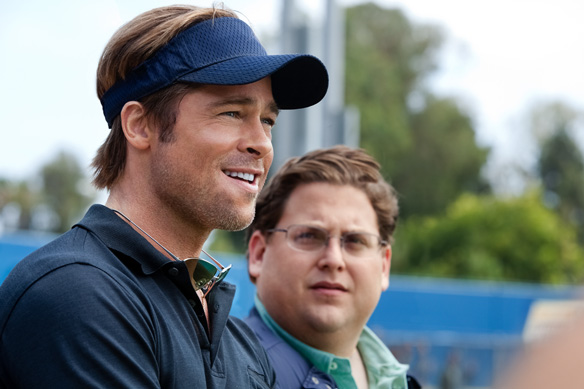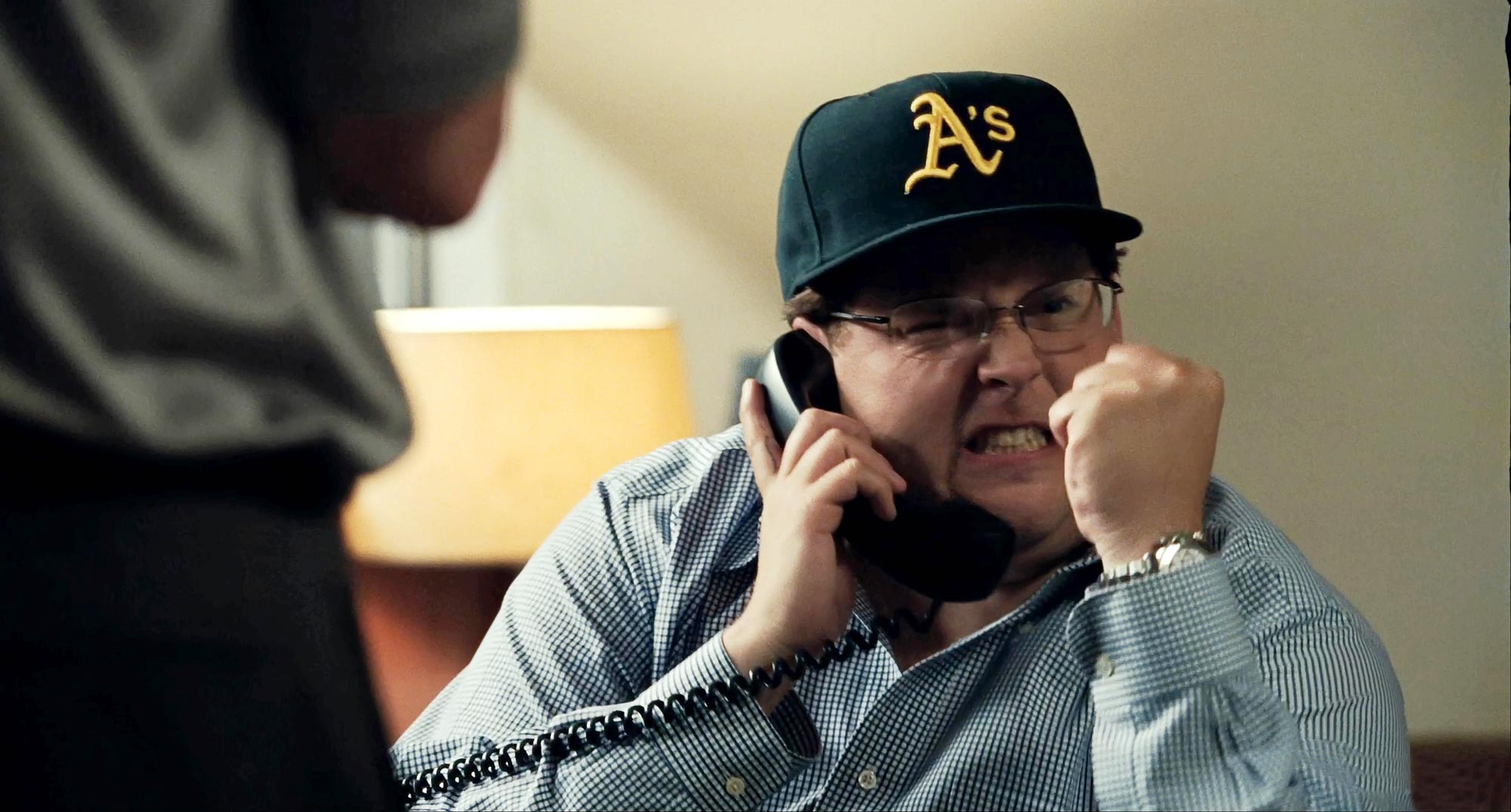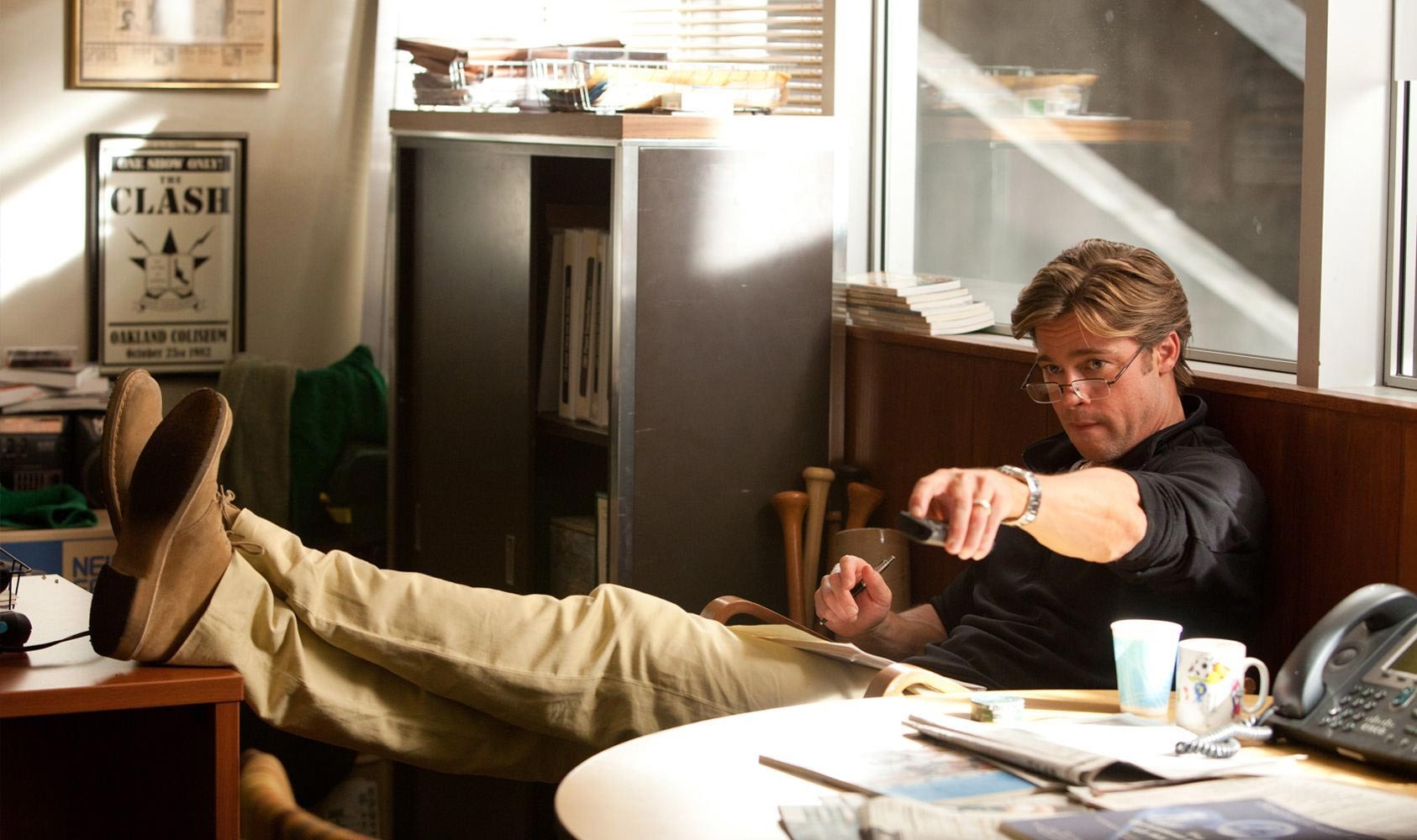Moneyball
 Sunday, March 4, 2012 at 07:22PM
Sunday, March 4, 2012 at 07:22PM 
In "Moneyball", a scout says to young Billy Beane, "All of us are told at some point that we can no longer play the children's game. Some hear it at 18, some hear it at 40. But we all hear it." I'd put off seeing this movie in that I've always found sports a massive snooze. Now I wish I hadn't. Though it keeps the camera trained mainly on the non-romantic, even the procedural--on backrooms and offices--"Moneyball" helped me understand, and even more than that made me feel, a romanticism I've never shared.
Businessmen, managers and coaches wrangle behind the scenes, and for them the children's game is about money, not love. It's always interesting to see how professional men--and it is all men here--talk to each other behind closed doors, and that's the kind of scene the ace team of Hollywood pros who made this film do well: writers Steven Zaillian and Aaron Sorkin and director Bennet Miller (who took Philip Seymour Hoffman, who plays the coach here, to an Oscar with "Capote"). While Zaillian and Sorkin proceed from the rule that "conflict is the essence of drama", their scenes are good because the conflict feels organic. The formula doesn't show through like it does with some, particularly TV, writers.
"Moneyball" of course is the true story of Billy Beane, who, as manager of the Oakland Athletics, pioneered the idea of building a team out of flawed players who could be bought cheap: men who, though damaged, could (at least on paper) produce the numbers they needed to hit to beat the big money boys.
This was based on crunching some fairly complicated math, but that was no problem for young consultant Peter Brand, from whom Billy first hears of this new way of conceiving of a baseball team. Jonah Hill deserved his Oscar nod for his character work as Brand. We all know guy like this: the unassuming, quiet fellow, a bit socially awkward, who's spent plenty of time alone studying his obsession. Peter has complete confidence in stats, probably because they're one thing you can count on in a world of unreliable human beings. He has the guileless honesty of the true fan, as well as that other hallmark of that specimen I've noted: they seem never to crow about the game. If you can't see how for yourself how fascinating it is, that's your problem.

Beane knows a smart kid when he sees one, and he is enough of a risk-taker to place his faith completely in Peter's numbers. They make an unlikely pair. What they share is the complete courage of their convictions.
I think of the scene where Billy gets Peter participating in his freewheeling telephone dealing over a player he covets. Feinting and dodging, Billy throws Peter's cautions to the wind, and even as Peter tries to reel him in he can't help getting swept away himself. His clenched-fist "Yes!" when the plan comes together is so genuine.
It's interesting the way "Moneyball" shows how the players themselves don't seem to have any more romantic attachment to any one team than I do towards the office. It's business, never personal. Peter dreads being the one to tell a player he's been traded, and yet it goes down just like Billy says it would: the player takes the news in about the same way I'd take being told they've changed the brand of coffee in the break room.
As a man whose dreams never quite came true, Pitt is well-cast. Like any proper man of baseball, he somehow manages perpetually to look like he has a big ol' wad of chaw in his lip. The walls of his office are festooned with Joe Strummer and Clash posters, which went a good way towards endearing the character to me. And as the recalictrant coach, Philip Seymour Hoffman looks for all the world like a big kid, a man in a boy's uniform, a visual embodiment of the idea that when grown men play a children's game it takes on a whole other level of metaphoric richness.
For all Zaillian and Sorkin's facility as writers of individual scenes, though, the film overall adheres rather too slavishly to script formula. You can feel life being forced to hit plot points: Billy must hit rock bottom and he must ascend from the ashes, and it all must happen when the clock reads such and such. Hey, I like the narrative of redemption Hollywood movies give us too. However, I'd rather not have the tips of the plot points stick through; I want them smeared in the messiness, the disorder, the unruliness of life.

At least life itself has robbed the writers of a World Series win for the underdogs. And yet...and yet. Life has given them plenty. When it looks as though the A's are about to blow what would have been their 20th win in a row, and Billy worries he's jinxed his team by turning up at the stadium to watch the game (which he never does), and the coach with whom Billy is always at odds takes a last-minute chance on a player he never, out of spite to Billy, puts in--the player who began the season thinking he was washed up--and that guy hits a homer...well, you couldn't make up stuff like that. And I was swept up. As Billy puts it, "How can you not be romantic about baseball?"
But the moment that knocks me out actually comes at the very end. Driving just to think, as he often does, Billy pops in a CD his young daughter has made him. He's struggling with the decision of whether to stay in Oakland or go for the big money and accept Boston's offer, which would make him the highest paid manager in history, but would mean never seeing his daughter and abandoning his dream of triumphing with the A's. She's singing him Lenka's "The Show", and when she gets to the final verse she gives it a loving, teasing tweak: "You're such a loser, dad, you're such a loser, dad...just enjoy the show."
Maybe by sports' lights, Billy is a loser. One of the reasons I like this movie, though, is it turns the sports idea of success--which is the American idea of success in many ways--on its head, and says that in the end it's our flaws, our weaknesses, that make us human. (Indeed, Billy's whole theory was based on the idea that flaws could be virtues.)
You've got to win the last game of the season or everything you've done until then is for nothing, Billy explains to Peter. People will forget that you won 20 games in a row. And yet Billy turns down Boston's deal. Love is more important. And faith, and hope...and following your dreams.
Taking us through the backrooms and the fields where men play their games--and through their imaginations, their hopes and dreams--"Moneyball" was a surprisingly poignant tour for a non-believer like me of that uniquely American realm where love and money play out: baseball.
Rating: ****
Key to ratings:
***** (essential viewing)
**** (excellent)
*** (worth a look)
** (forgettable)
* (rubbish!!)


Reader Comments